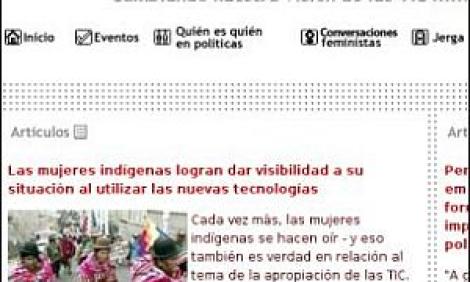In depth
Why Are Congolese Women Absent from Decision Making in ICTs?
By Sylvie Nyombo
The Republic of Congo is located in Central Africa, with an estimated population of 2,854,600in 2000. The urban population is at 66% and is concentrated in the southern areas of the country. Telecommunications infrastructures are decrepit, limited to the two biggest cities of the country (Brazzaville and Pointe-Noire). Despite the existence of private telecommunications companies, only mobile…
In depth
Pourquoi les femmes sont-elles absentes dans la prise de décision dans les TIC au Congo?
By Sylvie Nyombo
La République Congo est située en Afrique centrale et possède une population estimée à 2 854 600 habitants en 2000. Elle est urbaine à 66% et se trouve concentrée dans la partie sud du pays. Les infrastructures de télécommunications sont vétustes, limitées en grande partie aux deux grandes villes du pays (Brazzaville et Pointe-Noire). Malgré l’existence des sociétés de télécommunications privées…
In depth
Linking Czech women and e-government
By Kateřina Fialová
The APC WNSP panel “ICT and Equal Opportunities of Women and Men” took place on the April 3, 2006, the first of a two-day conference on Internet in Public Administration. Most panellists spoke about information and communication literacy as key to successful implementation of e-government objectives. At the same time, they listed ICT skills as the prime barrier that leads to a gender digital…
In depth
E-government: When the gender lens is missing...
By Kateřina Fialová
In the middle of 2005, the European team of APC WNSP took on a daunting task: to inject gender awareness into a regional conference focussing on the internet in public administrations . The annual e-government conference taking place in the Czech Republic celebrated its ninth year of existence in 2006. Yet, for the first time in its history, equal opportunity for women and men was put on the…
In depth
Reclaiming women’s space at the peace table : the Peacebuilding Cyberdialogue as a model of using ICTs for peacebuilding
By Mavic Cabrera-Balleza
Women are particularly impacted by war and violent conflicts - both as survivors as well as, crucially, being at the forefront of conflict prevention, conflict resolution and peace building. Mavic Cabrera-Balleza shares the Peacebuilding Cyberdialogue, a collaborative effort between the International Women's Tribune Centre and Isis WICCE, that brings together 40 women's organisations all over…
In depth
“The Burden of The Struggle” - Engendering Change in ICT Policy
By Cheekay Cinco
Cheekay Cinco, member of APC WNSP, interviews Nancy Hafkin, woman pioneer of networking and ICTs development in Africa on her thoughts about the current gender and ICT policy environment. She reflects on the WSIS process and the recent Commission on the Status of Women, and articulates what is urgently needed to render visible the gender dimensions of ICTs at policy levels.
In depth
Women, Media & ICTS: Where Do We Go From Here?
By Jac sm Kee
This article examines the progress made on the issue of Women, Media and ICTs at the level of international advocacy, particularly in relation to the Commission on the Status of Women and the Beijing Platform for Action. Questioning the disconnection between the fields of ICTs and women's rights, it looks at strategies of gender mainstreaming, and the need to have women in decision-making…
In depth
GenderIT en español: A brand new portal catalyses women’s voices in political sphere
By erika
Exactly one year after the successful introduction of GenderIT.org - the gender and information and communication technology (ICT) Policy Monitor in English - the APC WNSP now presents GenderIT en español, the Spanish counterpart of the monitor with original resources and coverage in Spanish, as well as in Portuguese.
In depth
Gender issues at all levels – from policy formulation to implementation
By Graciela Selaimen
Sonia Jorge is an expert in telecommunications regulation, economics and public policy and have been working as a consultant in the fields of communications policy and regulation, gender and development with experience in different countries and regions. Specialized in gender analysis and ICT policies, Sonia shares in this interview to GenderIT her vision on the critical needs for gender and ICT…
In depth
We assume FOSS benefits all equally. But does it really?
By Cheekay Cinco
FOSS has the potential to change the way women relate with ICTs, allowing for more control over the tools they use. As Users, women will have the freedom from steep licensing fees and the opportunity to influence software development to meet their needs. As developers, the open principle behind FOSS encourages a more collaborative environment, in which women may discover more freedom to create…












